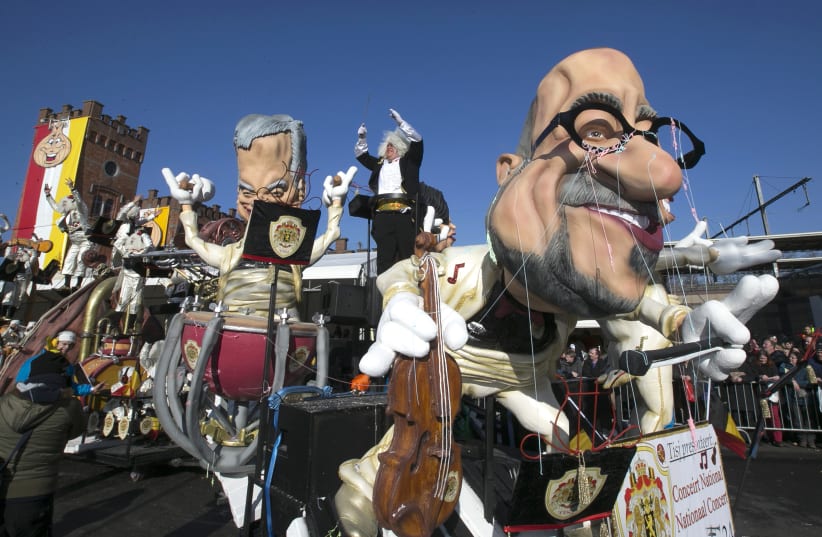The annual carnival in Aalst, Belgium, is expected to take place on Sunday with even more antisemitic elements than in previous years.
Aalst’s organizers have sold hundreds of “rabbi kits” for revelers to dress as hassidic Jews in the carnival’s parade. The kit includes oversized noses, sidelocks (peyot) and black hats. The organizers plan to bring back floats similar to the one displayed in 2019 featuring oversized dolls of Jews, with rats on their shoulders, holding banknotes.
“Belgium as a Western democracy should be ashamed to allow such a vitriolic antisemitic display,” Foreign Minister Israel Katz said Thursday. “I call upon the authorities there to condemn and ban this hateful parade in Aalst.”
Ambassador to Belgium Emmanuel Nahshon has been outspoken against the parade.
“It is a great pity that such an antisemitic carnival is allowed,” he told The Jerusalem Post. “Aalst is the only city in Europe where such a carnival is allowed. We call upon Belgian authorities, including city authorities of Aalst, to change their mind. We still have [time] until the carnival and hope reason will prevail and the antisemitic floats will be taken away.”
If the parade goes as planned, “it will be a moral blot on Belgium,” Nahshon said.
“The fight against antisemitism is also an Israeli fight,” he said. “Israel has to be very clear on the issue.”
The Aalst carnival lost its place on UNESCO’s Representative List of the Intangible Cultural Heritage of Humanity in 2019 after its mayor refused to remove antisemitic imagery from the parade.
This year’s parade is expected to specifically target Jews for mockery because of the controversy and loss of the carnival’s UNESCO status.
The carnival has long been a site of bigoted displays in general, including participants in blackface and displays mocking Muslims, and usually of specifically antisemitic imagery. In 2013, JTA reported carnival revelers in Nazi uniforms held canisters labeled “Zyklon B” while walking with other participants dressed as concentration camp prisoners.
While several Belgian officials have spoken out against the parade, no government action has been taken against it. One reason for this is the rise of Vlaams Belang, a far-right populist party with neo-Nazi roots, and a concern that banning the antisemitic floats will play into their hands.Antwerp Mayor Bart De Wever, whose city has a large Jewish community, said last month the parade “shows a lack of empathy” and is “disrespectful.”President of B’nai B’rith International Charles Kaufman said that "the antisemitic imagery in the Aalst Festival is demeaning and disgraceful. It disgraces the community and Belgium. It is not free speech; it is hate speech and, as a matter of respect and dignity, it should be disallowed.""Some people may view the imagery as good fun, but the determining factor is that the caricatures are images that incite hate and violence. How do we know? It is proven by history, actual events. Shame," Kaufman added.
Though Belgium – with a population of about 11,000,000 – has some 30,000 Jews, the Jewish community it is not planning any demonstrations against the carnival. One source said they are worried about calling negative attention to themselves and possibly provoking violence by going against the dominant culture.
In addition, a legal fight against the parade would be a challenge. According to Belgian law, one can only be indicted for racial incitement if he or she targeted and harmed a specific person.
Earlier this week, three Belgian professors who are experts in antisemitism, Vivian Liska, Didier Pollefeyt and Klaas Smelik, wrote in a much-quoted De Morgen op-ed that the media should not display the antisemitic images from the parade.
“We do not want to commit censorship, but we do want to point out the danger of spreading this type of anti-Jewish caricature,” Smelik said on Belgium’s Radio 1. “In the past, it has become apparent what kind of influence they can have on the opinions of ordinary people.”
European Jewish Press editor Yossi Lempkowicz this week said Aalst is near Kazerne Dossin, a transit camp from which the Nazis deported more than 25,000 Jews and Roma.
“Education against stereotypes is crucial to combating antisemitism and racism in general,” he wrote in the Brussels daily La Libre. “What example does this Aalst festival give to the young people who come by the hundreds to such events?”
In December, Aalst Mayor Christoph D’Haese of the Flemish nationalist N-VA Party said the parade mocks many different groups and should not be censored.
“We are neither antisemitic nor racist, and anyone who says that is acting in bad faith,” he said.
